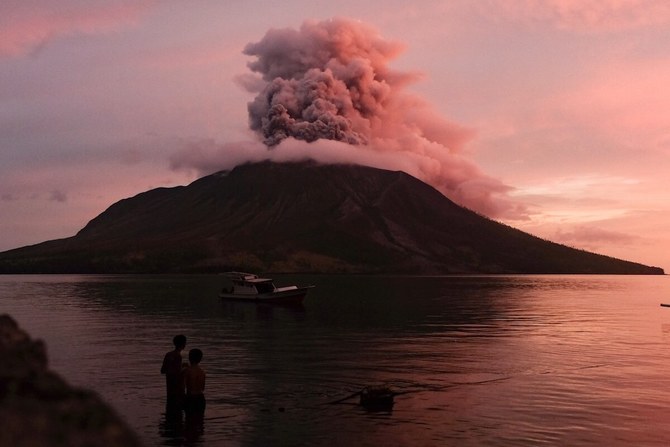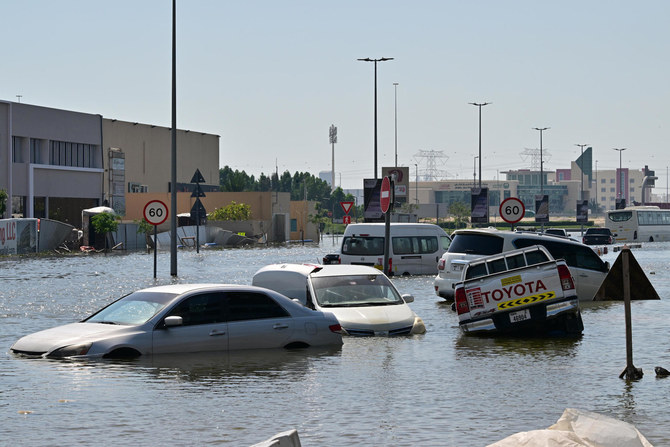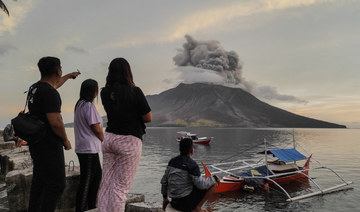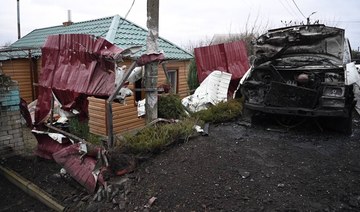DAVOS, Switzerland: People around the world place much more trust in their companies than their political leaders, according to a major survey that suggests a mood of uncertainty and pessimism on the eve of the World Economic Forum in Davos.
The annual Edelman Trust Barometer shows only one in five people believe the economic, political and social system is working for them, while nearly 60 percent think trade conflicts are hurting their companies and putting their jobs at risk.
The sense of gloom is strongest in developed markets led by Japan, where 84 percent of the general public — excluding the ‘informed public’ who are college-educated, earn above-average incomes and consume news regularly — do not believe they will be better off in five years’ time, followed by France at 79 percent, Germany at 74 percent and Britain at 72 percent. That is far above the average 49 percent of the 27 countries examined in the research.
Amid low confidence that politicians will fix the problems, these people are turning to companies, with 75 percent saying they trust “my employer,” compared to 48 percent for government and 47 percent for the media.
“CEOs now have to be visible, show personal commitment, absolutely step into the void, because we’ve got a leadership void in the world,” Richard Edelman, head of the communications marketing firm that commissioned the research, told Reuters.
Optimism was higher in the United States, where nearly half of the general public believed they would be better off in the next five years. The corresponding figure there was 62 percent for the better-educated, higher-earning “informed public.”
“The stock market was very good, the deregulation and lower taxes for the wealthy — it’s pretty good if you are an elite,” Edelman said of the US findings.
The survey, based on the opinions of over 33,000 people and conducted between Oct. 19 and Nov. 16, is published on the eve of the Davos gathering in the Swiss Alps, which this year brings together some 3,000 business and world leaders amid anxiety over the US-China trade war, Brexit and a slowdown in global growth.
“Violation of trust“
The pessimism in Japan, France, Germany and Britain reflects a variety of factors.
“I think Japan’s never really recovered from Fukushima, there was such a violation of trust when that happened,” said Edelman, referring to the authorities’ botched response to a massive nuclear accident in 2011.
Signs of slowing global demand and a sharp rise in the yen have clouded the outlook for Japan’s export-reliant economy, and the government plans tax hikes to pay for ballooning health care costs for its rapidly aging population.
“The problem for the three (European) countries.... is that given the reality of the potentially diminished economic future, there is deep anger in advance,” Edelman said.
In France, what started as a grassroots rebellion by low-paid workers to protest taxes on diesel fuel and a squeeze on household incomes has morphed into an assault on President Emmanuel Macron and his reforms, seen by the protesters as favoring the wealthy.
And in Britain, the Brexit crisis intensified last week after Prime Minister Theresa May’s two-year attempt to forge an amicable divorce from the European Union was crushed by parliament in the biggest defeat for a British leader in modern history.
The survey found that while only 49 percent of the wider population trusted institutions such as governments, this figure rose to 65 percent among high-income, college-educated and well-informed people — the biggest gap since the research began 19 years ago.
Despite widespread distrust of the media, uncertainty about the future has led to a sharp jump in people’s consumption and sharing of news and information, up 22 percentage points in a year to 72 percent.
But more than 70 percent said they worry about false information or fake news being used as a weapon.
In the United States, where President Donald Trump has repeatedly denounced the media as purveyors of fake news, trust in media varied widely depending on political affiliations.
Those who identified themselves as Republican voters showed only 33 percent trust in media, while 69 percent of Democrats did so.
Eve-of-Davos survey shows people place trust in companies over governments
Eve-of-Davos survey shows people place trust in companies over governments

- Only one in five people believe the economic, political and social system is working for them
- Nearly 60 percent think trade conflicts are hurting their companies and putting their jobs at risk
Indonesia on highest alert as Sulawesi volcano continues to erupt

- Over 7,500 people living near the volcano have so far been evacuated
- Volcanic activity is common in Indonesia, which lies on the Pacific ‘Ring of Fire’
JAKARTA: Indonesian authorities were on the highest alert on Saturday as a volcano in North Sulawesi continued to erupt. Thousands living nearby have been forced to leave their homes.
Mount Ruang, located on the northern side of Sulawesi Island, had at least eight eruptions since April 16, including a major one on Wednesday evening, which prompted Indonesia’s volcanology agency to issue its highest alert, which indicates an active eruption.
The center recorded at least two eruptions on Saturday, with the crater emitting white-gray smoke more than 1,200 meters above its peak after midnight, followed by another eruption at noon that released an ash column of about 250 meters.
“Based on visual observations, as of April 20, 2024, at 12:15 p.m., there is still high volcanic activity in Mt. Ruang,” Muhammad Wafid, head of the geology department at the Ministry of Energy and Mineral Resources, said in a statement.
“The potential danger is an explosive eruption that may cause the mountain to spew volcanic rocks in different directions, followed by clouds, as well as effusive eruption, or lava flow.”
With authorities having established a six-kilometer exclusion zone around the volcano, around 7,500 people have so far been evacuated, including more than 1,500 residents who live on the smaller island where Mount Ruang stands, and around 6,000 people living on neighboring Tagulandang island, northeast of the volcano, according to the latest data from Indonesia’s National Disaster Mitigation Agency. Thousands more are still at risk.
The international airport in Manado city, less than 100 kilometers away from Mount Ruang, is closed until at least Sunday because of volcanic ash.
“There are still concerns, because tremors and volcanic earthquakes are still being recorded by our devices, indicating magmatic fluid supply is still moving from the depth to the surface,” Hendra Gunawan, who heads Indonesia’s volcanology agency, told Arab News.
“There’s still potential for more eruptions … And a tsunami may occur if there is a large flow of volcanic material into the sea.”
Indonesia, a vast archipelago nation, has around 120 active volcanoes. The country experiences frequent seismic and volcanic activity due to its location on the arc of volcanoes and fault lines in the Pacific Basin known as the “Ring of Fire.”
Moscow says 50 Ukrainian drones shot down as attacks spark fires at Russian power stations

- Fifty drones were shot down by air defenses over eight Russian regions, including 26 over the country’s western Belgorod region
- Russia’s Defense Ministry said that it had shot down a Ukrainian Sukhoi Su-25 fighter jet
KYIV: Ukraine launched a barrage of drones across Russia overnight, the Defense Ministry in Moscow said Saturday, in attacks that appeared to target the country’s energy infrastructure.
Fifty drones were shot down by air defenses over eight Russian regions, including 26 over the country’s western Belgorod region close to the Ukrainian border. Two people — a woman with a broken leg and the man caring for her — died during the overnight barrage, after explosions sparked a blaze that set their home alight, Belgorod Gov. Vyacheslav Gladkov wrote on social media. A pregnant woman and her unborn child were also killed in shelling later Saturday, he said.
Drones were also reportedly destroyed over the Bryansk, Kursk, Tula, Smolensk, Ryazan, Kaluga regions across Russia’s west and south, as well as in the Moscow region.
Russia’s Defense Ministry said that it had shot down a Ukrainian Sukhoi Su-25 fighter jet. It provided no details and the claims could not be independently verified.
Ukrainian officials normally decline to comment about attacks on Russian soil. However, many of the drone strikes appeared to be directed toward Russia’s energy infrastructure.
The head of the Kaluga region, Vladislav Shapsha, said Saturday that a drone strike had sparked a blaze at an electrical substation, while Bryansk Gov. Alexander Bogomaz and Smolensk Gov. Vasily Anokhin also reported fires at fuel and energy complexes.
In recent months, Russian refineries and oil terminals have become priority targets of Ukrainian drone attacks, part of stepped-up assaults on Russian territory.
Ukrainian drone developers have been extending the weapons’ range for months, as Kyiv attempts to compensate for its battlefield disadvantage in weapons and troops. The unmanned aerial vehicles are also an affordable option while Ukraine waits for more US military aid.
Moscow also said Friday evening that an American citizen known to have fought with Kremlin-backed separatists in Ukraine between 2014 and 2017 had died in the Russian-occupied Donetsk region.
Russell Bentley, 64, was no longer involved in military operations and previously worked for state-owned Russian news agency Sputnik. His death was confirmed by his former battalion and by Margarita Simonyan, head of the state-funded television channel RT, who described him as “a real American.” He used the call-sign “Texas” and had spent time in prison on charges of drug smuggling before leaving the United States.
No information has been released as to the cause of Bentley’s death, but local police had previously reported the American as missing on April 8.
Meanwhile, Russia attacked Ukraine overnight with seven missiles, and air defenses downed two missiles and three reconnaissance drones, the Ukrainian air force said Saturday.
Gov. Oleh Kiper, head of Ukraine’s Odesa region, said that ballistic missiles had damaged infrastructure overnight, but did not provide further details. Previous attacks on the Black Sea city on Friday damaged port infrastructure, including two food export terminals, Ukrainian President Volodymyr Zelensky said.
Russian shelling also killed two men, including an 81-year-old pensioner in the city of Vovchansk, said Gov. Oleh Syniehubov, head of Ukraine’s Kharkiv region.
A 60-year-old woman was also injured after shelling struck a nine-story apartment block, he said.
Efforts underway to bring home Filipinos killed in UAE floods

- At least three Filipinos lost their lives in the unprecedented flooding
- Philippine consulate received assistance requests from at least 100 Filipinos
Manila: The Philippine government is assisting Filipinos affected by the record-high rains and flooding that hit the UAE this week, authorities said on Saturday, as it works to repatriate the nationals who lost their lives.
A strong storm first hit Oman last weekend, killing at least 20 people, before it pounded the UAE on Tuesday, marking the heaviest rains in 75 years and bringing the Gulf state to a standstill.
The Philippine Department of Migrant Workers has confirmed the deaths of at least three Filipinos who died in road accidents as their vehicles were submerged in floodwaters.
Philippine Consul General Marford Angeles told Arab News the consulate had received assistance requests from at least 100 Filipinos — some working in the UAE, some studying, and some transiting via Dubai.
“Over 1 million Filipino nationals are currently residing in the UAE ... Majority of assistance requests received by the consulate so far originate from the populous emirates of Dubai and Sharjah, reflecting the concentration of Filipino residents in these areas,” he said.
“The unprecedented weather conditions in the UAE affected most residents.”
The three Filipinos who lost their lives in the floods were two women who died inside their flooded vehicle, and a man who died after sustaining major injuries when his vehicle fell into a sinkhole. His two passengers have been hospitalized.
“The Department of Migrant Workers, through its Migrant Workers Offices in Dubai and Abu Dhabi, is working with local authorities for the repatriation of the remains of three overseas Filipino workers (OFWs) who died during the severe flooding,” the DMW said in a statement.
“Two other OFWs, both male, suffered injuries from the vehicular accident that happened in the sinkhole. They are recuperating from their injuries.”
US House to vote on long-awaited $95 billion Ukraine, Israel aid package

- Some hard-line Republicans have voiced strong opposition to further Ukraine aid
WASHINGTON: The Republican-controlled US House of Representatives on Saturday is set to vote on, and expected to pass, a $95 billion legislative package providing security assistance to Ukraine, Israel and Taiwan, over bitter objections from party hard-liners.
More than two months have passed since the Democratic-majority Senate passed a similar measure and US leaders from Democratic President Joe Biden to top Senate Republican Mitch McConnell have been urging embattled House Speaker Mike Johnson to bring it up for a vote.
Johnson this week chose to ignore ouster threats by hard-line members of his fractious 218-213 majority and push forward the measure that includes some $60.84 billion for Ukraine as it struggles to fight off a two-year Russian invasion.
The unusual four-bill package also includes funds for Israel, security assistance for Taiwan and allies in the Indo-Pacific and a measure that includes sanctions, a threat to ban the Chinese-owned social media app TikTok and the potential transfer of seized Russian assets to Ukraine.
“The world is watching what the Congress does,” the White House said in a statement on Friday. “Passing this legislation would send a powerful message about the strength of American leadership at a pivotal moment. The Administration urges both chambers of the Congress to quickly send this supplemental funding package to the President’s desk.”
A bipartisan 316-94 House majority on Friday voted to advance the bill to a vote, and Senate Majority Leader Chuck Schumer told senators to be ready to work over the weekend if it passes the House as expected.
“It’s not the perfect legislation, it’s not the legislation that we would write if Republicans were in charge of both the House, the Senate, and the White House,” Johnson told reporters on Friday. “This is the best possible product that we can get under these circumstances to take care of these really important obligations.”
Some hard-line Republicans have voiced strong opposition to further Ukraine aid, with some arguing the US can ill afford it given its rising $34 trillion national debt. They have repeatedly raised the threat of ousting Johnson, who became speaker in October after his predecessor, Kevin McCarthy, was ousted by party hard-liners.
Representative Bob Good, chair of the hard-line House Freedom Caucus, told reporters on Friday that the bills represent a “slide down into the abyss of greater fiscal crisis and America-last policies that reflect Biden and Schumer and (House Democratic leader Hakeem) Jeffries, and don’t reflect the American people.”
But Republican presidential candidate Donald Trump, who carries huge influence in the party, on April 12 voiced support for Johnson and in a Thursday social media post said Ukraine’s survival is important for the US
The bills provide $60.84 billion to address the conflict in Ukraine, including $23 billion to replenish US weapons, stocks and facilities; $26 billion for Israel, including $9.1 billion for humanitarian needs, and $8.12 billion for the Indo-Pacific.
AI’s relentless rise gives journalists tough choices

- AI tools imitating human intelligence are used to transcribe sound files, summarize texts and translate
- Columbia University teacher says collaborating with AI “tempting” in the face of increasingly right media resources
PERUGIA, Italy: The rise of artificial intelligence has forced an increasing number of journalists to grapple with the ethical and editorial challenges posed by the rapidly expanding technology.
AI’s role in assisting newsrooms or transforming them completely was among the questions raised at the International Journalism Festival in the Italian city of Perugia that closes on Sunday.
AI tools imitating human intelligence are widely used in newsrooms around the world to transcribe sound files, summarize texts and translate.
In early 2023, Germany’s Axel Springer group announced it was cutting jobs at the Bild and Die Welt newspapers, saying AI could now “replace” some of its journalists.
Generative AI — capable of producing text and images following a simple request in everyday language — has been opening new frontiers as well as raising concerns for a year and a half.
One issue is that voices and faces can now be cloned to produce a podcast or present news on television. Last year, Filipino website Rappler created a brand aimed at young audiences by converting its long articles into comics, graphics and even videos.
Media professionals agree that their trade must now focus on tasks offering the greatest “added value.”
“You’re the one who is doing the real stuff” and “the tools that we produce will be an assistant to you,” Google News general manager Shailesh Prakash told the festival in Perugia.
The costs of generative AI have plummeted since ChatGPT burst onto the scene in late 2022, with the tool designed by US start-up OpenAI now accessible to smaller newsrooms.
Colombian investigative outlet Cuestion Publica has harnessed engineers to develop a tool that can delve into its archives and find relevant background information in the event of breaking news.
But many media organizations are not making their language models, which are at the core of AI interfaces, said University of Amsterdam professor Natali Helberger. They are needed for “safe and trustworthy technology,” he stressed.
According to one estimate last year by Everypixel Journal, AI has created as many images in one year as photography in 150 years.
That has raised serious questions about how news can be fished out of the tidal wave of content, including deepfakes.
Media and tech organizations are teaming up to tackle the threat, notably through the Coalition for Content Provenance and Authenticity, which seeks to set common standards.
“The core of our job is news gathering, on-the-ground reporting,” said Sophie Huet, recently appointed to become global news director for editorial innovation and artificial intelligence at Agence France-Presse.
“We’ll rely for a while on human reporters,” she added, although that might be with the help of artificial intelligence.
Media rights watchdog Reporters Without Borders, which has expanded its media rights brief to defending trustworthy news, launched the Paris Charter on AI and journalism late last year.
“One of the things I really liked about the Paris Charter was the emphasis on transparency,” said Anya Schiffrin, a lecturer on global media, innovation and human rights at Columbia University in the United States.
“To what extent will publishers have to disclose when they are using generative IA?“
Olle Zachrison, head of AI and news strategy at public broadcaster Swedish Radio, said there was “a serious debate going on: should you mark out AI content or should people trust your brand?“
Regulation remains in its infancy in the face of a constantly evolving technology.
In March, the European Parliament adopted a framework law aiming to regulate AI models without holding back innovation, while guidelines and charters are increasingly common in newsrooms.
AI editorial guidelines are updated every three months at India’s Quintillion Media, said its boss Ritu Kapur.
None of the organization’s articles can be written by AI and the images it generates cannot represent real life.
AI models feed off data, but their thirst for the vital commodity has raised hackles among providers.
In December, the New York Times sued OpenAI and its main investor Microsoft for violation of copyright.
In contrast, other media organizations have struck deals with OpenAI: Axel Springer, US news agency AP, French daily Le Monde and Spanish group Prisa Media whose titles include El Pais and AS newspapers.
With resources tight in the media industry, collaborating with the new technology is tempting, explained Emily Bell, a professor at Columbia University’s journalism school.
She senses a growing external pressure to “Get on board, don’t miss the train.”



















